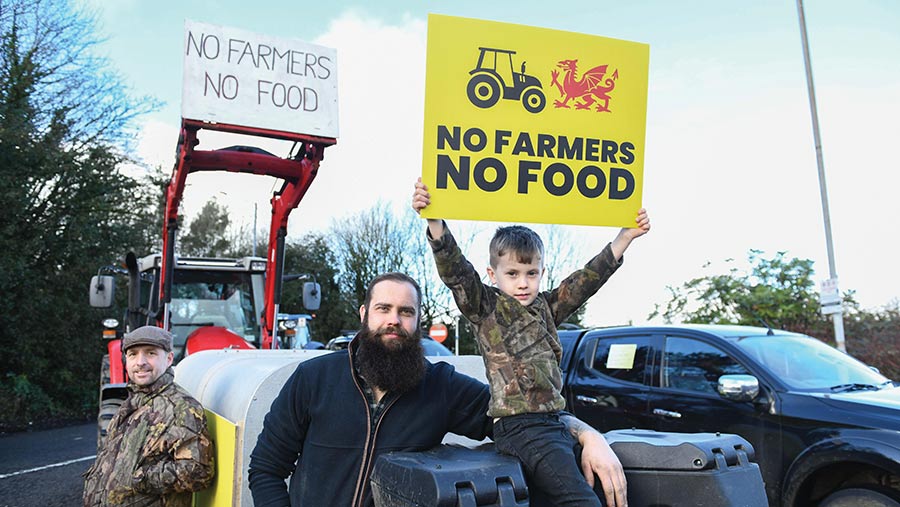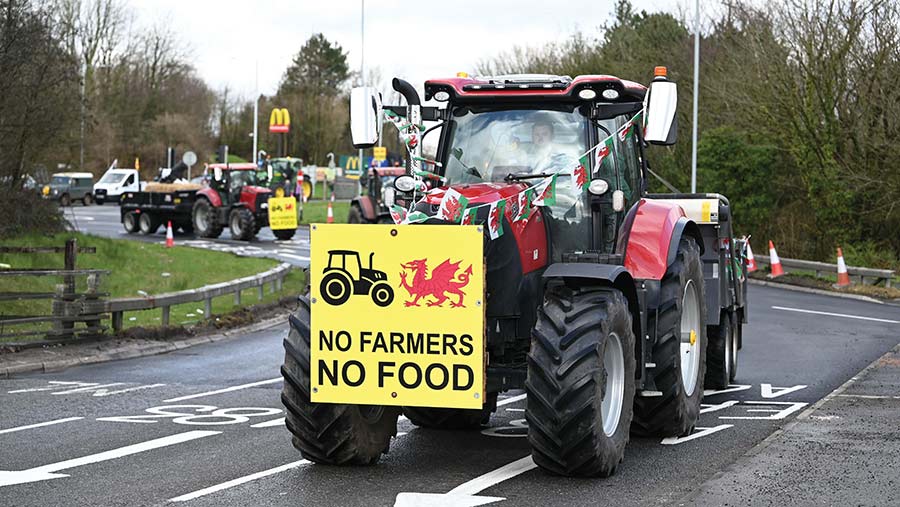No Farmers, No Food: What is all the fuss about?
 Farmer Phil Andriola with son Luca protesting in Wales © Robert Melen/Alamy Stock Photo
Farmer Phil Andriola with son Luca protesting in Wales © Robert Melen/Alamy Stock Photo The newly founded No Farmers, No Food campaign group has attracted almost 60,000 followers on X (formerly Twitter) in less than a month. That’s 14,000 more than the current NFU membership of about 46,000.
Founder James Melville admits he is surprised at how quickly the group has “amplified” on social media. He has also launched Facebook and Instagram accounts and a new website is on the way later this month.
See also: No Farmers, No Food founder tackles concerns about campaign
James describes himself as a media commentator and pundit who lives in Cornwall. Although he does not farm now, he says he grew up on a family farm in Fife, and lived there until he left university.
He also sits on the board of Together, which has run campaigns against Covid-19 lockdowns and the Ultra Low Emission Zone in London.
James has faced criticism on social media about his connections to Together, including its anti-net zero stance. Some have claimed his No Farmers, No Food group will also push an anti-climate change agenda, which he has denied.
‘Non-partisan’
James says No Farmers, No Food has no hidden political agenda, but seeks to create a “unified and non-partisan” campaign for UK farmers.
He insists he created No Farmers, No Food “in good faith” to promote the interests of British farmers, highlight their concerns and achieve better outcomes from policymakers and governments.
He set up the group after watching the coverage of farmers protesting across central Europe over the past few months, and speaking out about anti-farming policies and unfairness in the supply chain.
Although some farmers have displayed yellow “No Farmers, No Food” placards on their tractors in recent protests in the UK, James insists the group is not behind any of the protests and has no plans to organise any in the future. “We are not organising any direct protest actions,” he explains.

© Robert Melen/Alamy Stock Photo
Mission statement
This week, No Farmers, No Food laid out its mission statement, which includes a range of topics, including legislation, unfair pricing, government subsidies and farmers’ wellbeing.
James says the statement was drafted by two to three people, including himself, following input from farmers on phone calls, online meetings and suggestions received on its internal WhatsApp group.
He insists the campaign is not receiving any financial backing and no one involved is being paid, including himself. “We are all contributing to this campaign in our spare time, alongside our jobs,” he says.
Key themes the campaign will focus on
No Farmers, No Food will be focusing on a number of key campaign themes.
These include unfair supermarket purchase prices for farmers, the competitive disadvantage to UK farmers from imported foods and mental health issues within farming.
Other policy areas include risks to farmland due to unmaintained flood defences from the Environment Agency, and any government legislation that creates risk, uncertainty or potential financial loss to farming incomes and circular rural economies.
“We will take into account farming concerns while understanding the nuances and challenges faced by different sectors and scales of farming,” says campaign founder James Melville.
High-profile farmers voice support for campaign…
No Farmers, No Food has attracted support from high-profile farmers such as Gareth Wyn Jones, Andrew Ward, Olly Harrison and Anna Longthorp.
Gareth, a well-known farming media commentator and hill farmer based in Llanfairfechan, Conwy, says: “I’m backing the No Farmers, No Food campaign because it is really important to get our message over to politicians and the public. Education is key.
“We need people to understand where their food comes from. For me, in Wales, it’s the three points: nitrate vulnerable zones, bovine TB and the Sustainable Farming Scheme. As long as we can get the message out there, that’s fantastic.”
Younger farmers are also getting behind the campaign.
James Telfer, a 40-year-old mixed farmer based in Kirkcaldy, Fife, says: “There are so many issues facing the farming industry right now, from extreme weather, green taxes and loss of support to staffing issues and mental health.
“There are about 20 farmers from across the UK behind the running of this organisation. We’re all working together on this and none of us are being paid.
“Some people are trying to throw stones at us, but we believe this campaign offers the industry a unified channel for farmers to get their messages across.”
‘Get on board’
Peter Dawe is a former UKIP candidate in Cambridgeshire, who also ran for parliament in the 2019 general election, standing as the Brexit Party candidate for Cambridge “on an anti-Brussels platform”. But he lost to Labour Party candidate Daniel Zeichner, receiving 1.9% of the vote.
Peter, who owns a mixed farm in Norfolk, describes himself as “the ultimate cynic in regards to politicians”, which, he says explains why he also stood as an independent candidate in 2017 for the newly created combined Mayor of Cambridgeshire and Peterborough role.
He also lost, on this occasion, to Conservative candidate James Palmer, receiving 4.6% of votes in the first round of voting.
Peter believes No Farmers, No Food is a great cause and he urges everybody to get on board with the campaign.
He had suggested on The Farming Forum (TFF) that farmers should protest outside their local MPs’ constituency offices on Good Friday (29 March).
He asked for volunteers to help organise it, but the response fell flat and received some negativity.
“I did expect to get more support than one volunteer. Maybe the people posting on TFF are not necessarily the farmers who are distressed,” he says.
Farmers in England have not been out protesting to the same extent as their European colleagues.
Peter reckons this is not a case of “safety in numbers”, but about identifying and getting behind a common cause.
“One farmer protesting with a banner doesn’t have much impact, but if we’re getting the message to every MP, they might sit up and say, ‘we have a problem here’.”
Peter says many media outlets are wrongly suggesting that farmers in the UK are pursuing an “anti-green” agenda with their protests.
“It’s actually about making farming financially viable. All these other things are symptoms, rather than the cause.”
…but critics temper enthusiasm with concerns
Liz Webster, founder of the Save British Farming group and a former prospective parliamentary candidate for the Liberal Democrats welcomes all campaigns that highlight the many difficulties affecting British farming.
But she adds: “My concern with this campaign is it seems to focus energy on net zero and blaming Labour for net zero. It would be very damaging for the industry to be linked to climate sceptics and be too involved in political mud-slinging.”
British Farming Union chairman Steve Ridsdale says some of the No Farmers, No Food messaging mirrors their aims, including greater supply chain fairness for farmers.
Asked why English farmers were not staging or planning large demonstrations like Welsh or European farmers, Steve says: “We haven’t been asked by No Farmers, No Food to co-ordinate any protests, but 73% of our members would support peaceful protests, according to a recent poll.
“You can understand why Welsh farmers are protesting, as the policy is being forced on them.
“If they want their subsidies, they’ll have to take 20% of land out of production, whereas Defra has adopted a more flexible approach with the SFI [Sustainable Farming Incentive].
“In England, the appetite for protests may grow in the next 18 months when farmers see their direct payments diminishing, there are no price increases and cheap imports start flooding in.”
‘Threat to British farming’
Graham Bottley is a Yorkshire Dales sheep farmer with a doctorate in viral immunology and 28 years’ experience in the field.
He also tweets under @SwaledaleMutton on X, where he has been engaged in a spat with No Farmers, No Food supporters, including founder James Melville, who has spoken out against Covid-19 rules.
Graham describes the campaign as a “major threat to British farming”.
He says: “The campaign has already caused significant division and damage to the farming sector at a time when it needs real and honest support.
“Progress within farming will come from sensible discussion, not the importation of populist tactics and climate denial from the hijacked European protests.”
Tim Bonner, chief executive of the Countryside Alliance, said: “No Farmers, No Food is an emotive message and farming has a very powerful brand that is totemic for many people. This gives farmers real influence.
“We need the whole country to be united in support of a sustainable future for farming and not alienate any part of society.”
